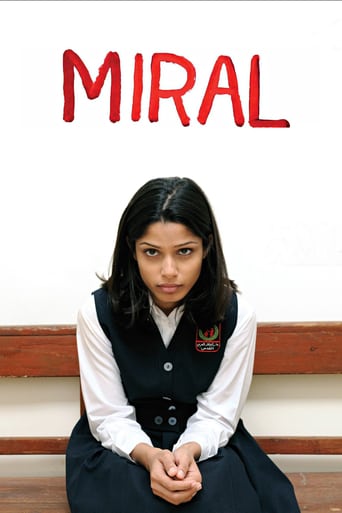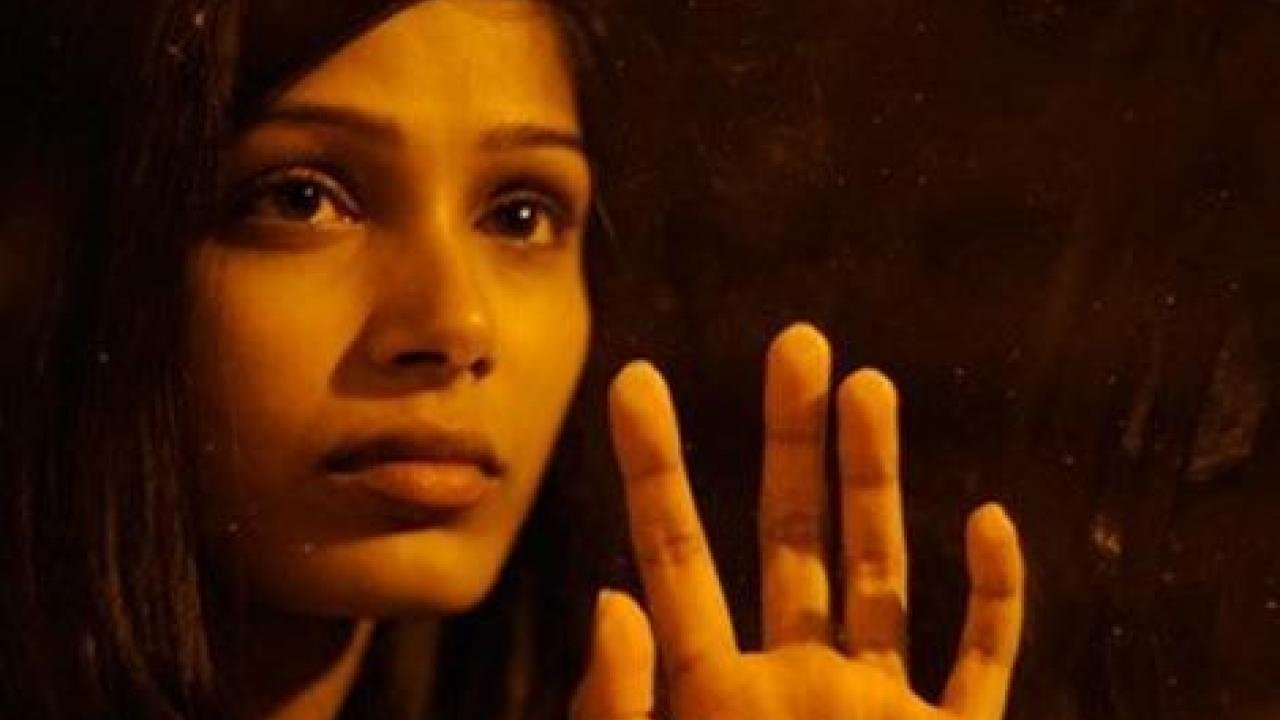composertrevor
This is a Must See film. Julian Schnabel's 'Miral' is a moving and well structured film. Following the general structure of Rula Jebreal's book of the same title, we follow a logical journey through a number of lives and events that focus on the founding of the Dar El Tiffel orphanage by the wonderful Hind Husseini, and her mentoring of Miral, the daughter of a local Imam whose wife committed suicide. Set within the Israeli-Palestinian conflict, both the novel and film offer no solutions, except a belief on both sides that peace can be obtained.The film, based on Jebreal's own childhood and youth, sing the praises of education as the tool to escape ignorance and lack of opportunity. The orphanage becomes an escape from the harsh realities of the conflict, and offers a haven for the girls it fosters and teaches. The film isn't so much about the two sided conflict as being a story about women and education. Hind Husseini gained much respect in her lifetime, receiving awards, and giving public addresses about education for women.The Education, Education, Education message is one that has become so important throughout all middle eastern countries, very much resonating with the advocacy work of people like Queen Rania of Jordan, Sheikha Mosa of Qatar and the education initiatives in the UAE. Regional conflict can only be quelled when a nation's people are well educated and informed, and this came through in the words of Hind.This film is important and highly recommended.
ignominia-1
I did not know what the movie was about so when it started my first reaction was: "Oh no! not another movie on Jewish suffering!" I was pleasantly surprised to discover that this time the movie was about the Palestinian plight. Kudos to that I say, nevertheless I found the story confusing. I am a fan of Julian Schnabel's work as director, but I expected more after The Bell-jar and the Butterfly which in my book was a masterpiece. Miral (not an apt title for the subject matter) takes its time before getting to the main story and protagonist, telling first the tale of 3 other women: Her mother Nadia; Fatima the terrorist; and Hind the school master and surrogate mother to all orphans. Miral's arrival on the scene is almost an afterthought, hinted at by Nadia's vomit attack upon arriving in jail -if she is sickened by fear or by baby is not clear until much later on.I wished the director let the people speak in Arabic and add subtitles -which were used only in the beginning- it would have made for a less Anglo-centric flavored film and the written text would have allowed the audience to catch important dialog that was otherwise drowned by the soundtrack. What Fatima says to the man who later becomes Nadia's husband, for example, would have explained later events. Same for what was exchanged between Miral and the Intifada member at the funeral, important words muffled in music. Because of this and the confusing ways of past and present scenes mixing without a clear way to distinguish between them, the storyline of the movie was unclear, and so was its perception similar to walking in the dark, intuiting the outline of things but not getting the full picture. All actors were good but Hiam Abass who played Hind stood out. Freida Pinto does not look authentic, I read she is of Indian heritage, but her beauty made the distressing story more bearable, if distracting. Aside from this, it was refreshing to see a movie on this subject matter, produced and directed by major names in the movie industry. To see the Israeli seen as "bad guys" was almost shocking, what with the Jewish propaganda we get out of Hollywood all the time. The world needs to see Palestinian heroes, if nothing else to balance the way Arabs in general are portrayed in the movies. A movie worth seeing if NOT the ultimate picture on the subject.
gavin6942
A drama centered on an orphaned Palestinian girl (Freida Pinto) growing up in the wake of Arab-Israeli war who finds herself drawn into the conflict.You might wonder: Freida Pinto is Indian, so why was she cast as Palestinian? -- Some critics took exception to this, or the idea that she is too beautiful to play an ordinary girl. Are ordinary girls not allowed to be beautiful? And while her Indian heritage may seem out of place, I think this should be overlooked in light of the fact she is a tremendous actress and sold the character well.What is so great about this film is that the politics are not the issue. The life of a young girl is. This is a film that shows the humanity of the Palestinians -- the DVD cover asks if Miral has the "face of a terrorist". After seeing the film, you have to say no. While the story covers a wide swath of history, from 1947 to the 1993 Oslo agreement, the politics are not the problem.Schnabel tells me many of the critics were negative, and I do see some complaints that the editing was choppy, or the bizarre remark that Schnabel does not know how to direct women. Presumably many critics took exception to the positive portrayal of the Palestinians and the negative portrayal of the Israelis.In fact, though, this is how one might view the film if looking for a certain angle. The Israelis are presented negatively, yes, but not inaccurately. But the Palestinians are not really presented positively -- just as human beings. There is still a father telling her daughter not to get mixed up with the PLO, and one scene has a stepfather raping his wife's daughter. That can hardly be seen as being positive (though the real point here is that people should be judged as individuals, not as members of a group).The cast is all excellent, with plenty of Arab flavor. We have Willem Dafoe (a native of my city, Appleton) and Vanessa Redgrave for the "white" aspect. And then Alexander Siddig, probably best known as Bashir from "Star Trek", somewhere in-between (Siddig was born in Sudan, but was educated in London).The film is PG-13, making it less raw but more accessible to audiences. This may have toned down the realism a bit, but it in no way compromised the emotional outreach that was a steady undercurrent.Geoffrey Macnab calls the film "courageous and groundbreaking", while Mike Goodridge calls it "sincere and thought-provoking". Both are correct. The more unusual comment comes from Claudia Puig, who says, "Schnabel puts his unmistakable dreamlike stamp on the film." Now, Schnabel is first and foremost a painter, so his goal is art. But to call this film "dreamlike" just seems off. This struck me as pure realism all the way. But who am I to judge? Anyway, great film, and one that will be sure to spark discussion regardless of which side (if any) you stand on in the ongoing Middle East debate.
moviexclusive
Political films based on actual events are usually angry sentiments and have a strong point to make. This biographical drama is no different. Based on Rula Jebreal's novel, the emotionally charged production gives us an insight on the political unrest and instability happening on the other side of the world. Regard it educational if you will, this Julian Schnabel directed film will leave you wondering what it takes to live a life surrounded by the horrors of war.The film chronicles Hind Husseini's effort to build an orphanage in Jerusalem after the 1948 Arab Israeli War. This began with her crossing paths with 55 orphaned children while on her way to work one day. She took them home and before she knew it, she had almost 2000 orphans under her care. The Dar Al-Tifel Institute was born, and thousands of orphaned children came under Husseini's care. Some 30 years later, Miral, a motherless child was sent to the orphanage by her father. Upon turning 17, she is sent to a refugee camp where she experiences the tension between Israel and Palestine, and the possible destructions it can bring to her own life.Director Schnabel is known for his award winning works The Diving Bell and the Butterfly (2007) and Before Night Falls (2000), and it comes as no surprise that the New York born filmmaker's latest project deals with such politically charged themes, despite the foreign lands the story takes place in. Through gritty cinematography (read: shaky camera work) and choppy editing (read: abrupt cuts and transitions), Schnabel shows us a world which we have only read about but never had the chance to experience. Sure, there may be no beautifully decorated sets with perfectly synchronized action sequences, but this is the slices of reality which the locals have to live with day after day.It is also clear that the film presents a Palestinian perspective of things, and may appear one sided to viewers who are expecting this to be objective. Do note, however, that this is based on a memoir by Jebreal, and it is only natural that the war is seen through her eyes.Amidst the violence and assaults, there is tenderness and compassion in the 112 minute film as Schnabel tells a story of remarkably strong women surviving in times of turmoil. Their intertwined tales may be unevenly told, but you'd feel a sense of passion and zeal as they go through life fighting for their beliefs and causes.Playing the central character Husseini is Hiam Abbass (The Visitor, Munich), a Palestinian actress who injects the much needed fervour into her character. Frieda Pinto (Slumdog Millionaire) plays the titular character, and viewers get to see how a girl who is initially brought up safely inside the orphanage's walls gradually grows into a young woman who is awakened by the reality around her and has to fight for her convictions. Appearing in supporting roles are familiar faces like Willem Dafoe (Daybreakers) and Vanessa Redgrave (Letters to Juliet) in the first few minutes of the film.The film ends without any closure or resolution, which reflects the harsh realities happening on the other side of the planet we live in. And that, in our opinion, is the best way to leave us reflecting on the unnecessary pain and tragedies brought about by war.www.moviexclusive.com



 AD
AD



